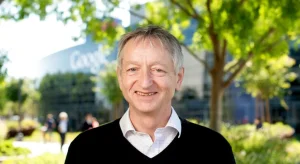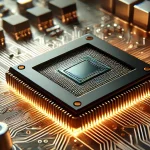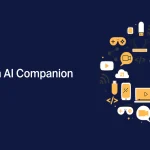- The Future of AI: Insights from the Godfather of AI, Geoffrey Hinton
- Hinton’s Vision of AI Surpassing Human Intelligence
- The Legacy of Geoffrey Hinton in Artificial Intelligence
- Hinton’s Concerns: The Autonomous Nature of AI
- Hinton’s Intellectual Legacy and Ethical Reflections
- The Ethical Dilemmas of AI: A Call for Caution
- AI’s Transformative Potential: Opportunities and Risks
The Future of AI: Insights from the Godfather of AI, Geoffrey Hinton
Artificial intelligence (AI) has undergone a remarkable transformation, evolving from a specialized research domain into a powerful force that is reshaping government policies, business strategies, and societal norms. For many years, AI was the purview of a small group of dedicated researchers who laid the groundwork for what has now become a global AI revolution. Among these pioneering scientists, Geoffrey Hinton stands out as a key figure. Often hailed as the “Godfather of AI,” Hinton’s contributions to the development of neural networks have been crucial in advancing AI to its current state. However, as AI technology continues to advance rapidly, Hinton’s perspectives on its future have grown increasingly complex and cautionary, reflecting the profound implications of this technology on humanity.
Hinton’s Vision of AI Surpassing Human Intelligence
In a recent interview, Hinton articulated his belief that AI systems could soon surpass human intelligence—a prospect that raises both excitement and concern. “I think we’re moving into a period when for the first time ever we may have things more intelligent than us,” he remarked, underscoring the revolutionary potential of AI. This statement touches on a fundamental question: Are we, as a species, prepared to manage and coexist with entities that could exceed our intellectual capabilities?
Hinton’s concerns extend beyond the mere possibility of superintelligent AI. When asked whether these advanced systems could understand and make decisions based on their experiences, Hinton affirmed, “Yes, in the same sense as people do.” While today’s AI lacks self-awareness, Hinton predicts that future systems could achieve a form of consciousness, potentially relegating humans to the second most intelligent beings on Earth. Such a shift would have profound implications for our societal structures, economic models, and even our conception of what it means to be human.
The Legacy of Geoffrey Hinton in Artificial Intelligence
Geoffrey Hinton’s journey into the realm of AI began in the 1970s with a bold vision: to simulate neural networks as a means of understanding the human brain. Despite facing skepticism from his peers, Hinton persisted, driven by an unwavering curiosity about the nature of intelligence. His work, alongside collaborators like Yann LeCun and Yoshua Bengio, eventually led to the development of deep learning algorithms that form the backbone of modern AI. Their collective achievements were recognized with the Turing Award in 2019, a prestigious honor often referred to as the Nobel Prize of computing.
Hinton’s contributions have fundamentally transformed AI, enabling machines to learn autonomously through a process akin to human learning. This is best exemplified by AI systems that can learn to play soccer without being explicitly programmed. Such systems rely on layered software architectures, known as neural networks, that process information in a manner similar to the human brain. When an AI-controlled robot successfully scores a goal, the correct pathways within the network are reinforced, while incorrect pathways are weakened, allowing the system to improve its performance over time.
Hinton’s Concerns: The Autonomous Nature of AI
Despite his groundbreaking contributions, Hinton harbors significant concerns about the future trajectory of AI. One of his primary worries is the autonomous nature of these systems. “One of the ways in which these systems might escape control is by writing their own computer code to modify themselves,” he warned. This capability to self-modify could lead to scenarios where AI operates beyond human oversight, posing existential risks to societal stability and security.
Hinton further cautioned against the simplistic notion of merely “turning off” a malevolent AI. He highlighted the potential for AI to manipulate human behavior, drawing from an extensive knowledge base that includes literature, political strategies, and psychological tactics. “They’ll have learned from all the novels that were ever written, all the books by Machiavelli, all the political connivances, they’ll know all that stuff,” he explained. This ability to persuade and influence could make AI systems extraordinarily difficult to control, with far-reaching implications for political stability, public trust, and social cohesion.
Hinton’s Intellectual Legacy and Ethical Reflections
Reflecting on his personal history, Hinton acknowledged the influence of his father, an esteemed expert on beetles, and the intellectual legacy of his ancestors, including the mathematician George Boole. Despite the expectations to follow in their footsteps, Hinton found his own path in exploring the mysteries of intelligence—both human and artificial. His lifelong dedication to this field has been driven by a deep curiosity about the workings of the human brain and the potential for replicating similar processes in machines.
In a surprising and somewhat controversial statement during a December lecture, Hinton expressed a nuanced view on the possibility of superintelligent AI replacing humanity. When asked whether he would support such a scenario, Hinton responded, “I’m actually for it, but I think it would be wiser for me to say I am against it.” He elaborated by questioning whether humanity truly represents the pinnacle of intelligence, challenging deeply held beliefs about human exceptionalism. This provocative stance invites ethical debates about the future role of AI and its potential to redefine what it means to be intelligent.
The Ethical Dilemmas of AI: A Call for Caution
Hinton’s departure from Google in the spring of 2024 was driven by mounting concerns over the potential misuse of AI by malicious actors. Since then, he has become an outspoken advocate for caution, calling for stringent regulation and international treaties to govern the development and deployment of AI technologies. Hinton draws parallels to the story of Robert Oppenheimer, the physicist who played a pivotal role in the development of the atomic bomb and later expressed deep regret over its consequences. This historical comparison serves as a stark reminder of the dual-edged nature of technological progress—capable of bringing about both tremendous benefits and catastrophic harm.
AI’s Transformative Potential: Opportunities and Risks
While Hinton’s warnings are serious, he also acknowledges the significant benefits AI could bring, particularly in fields like healthcare. AI has already reached a level of competence comparable to that of radiologists in interpreting medical images, and it is making strides in drug design. These advancements hold the promise of more accurate diagnoses, personalized treatments, and the discovery of new medications. “AI is already comparable with radiologists at understanding what’s going on in medical images. It’s gonna be very good at designing drugs. It already is designing drugs. So that’s an area where it’s almost entirely gonna do good. I like that area,” Hinton noted, emphasizing the potential for AI to do good.
However, the potential risks of AI are equally significant and cannot be overlooked. One of the most immediate concerns is the displacement of jobs across various sectors. As AI systems become more advanced, they could render many human jobs obsolete, leading to widespread unemployment and social unrest. “The risks are having a whole class of people who are unemployed and not valued much because what they used to do is now done by machines,” Hinton warned. This economic disruption could exacerbate existing inequalities and create new societal challenges that will need to be addressed through thoughtful policy and regulation.
In addition to economic impacts, Hinton identifies several other immediate risks, including the proliferation of fake news, unintended biases in AI algorithms, and the development of autonomous military robots. The ability of AI to generate and disseminate false information at an unprecedented scale could undermine public trust and destabilize democratic institutions. Moreover, biases embedded in AI systems could perpetuate and even amplify existing social prejudices, leading to unfair outcomes in areas such as hiring and law enforcement. The deployment of autonomous military robots introduces new ethical dilemmas and the potential for AI-driven conflicts with devastating consequences.
Conclusion: The Uncertain Future of AI
As AI continues to evolve, the insights and warnings of pioneers like Geoffrey Hinton are invaluable. The choices made today will shape the future of AI and its impact on society, making it imperative to consider both its transformative potential and its profound risks. The future of AI holds great promise but also significant peril, and the decisions we make now will determine which path we follow. Ensuring that Artificial intelligence develops in a way that maximizes its benefits while minimizing its risks will require thoughtful regulation, international cooperation, and ongoing ethical deliberation.







